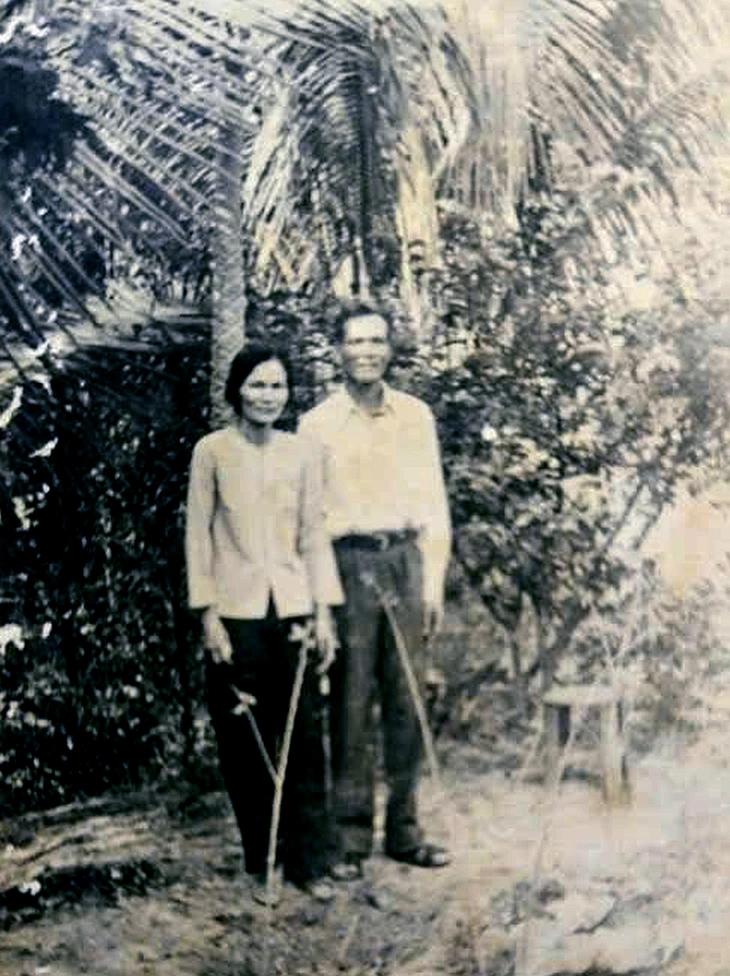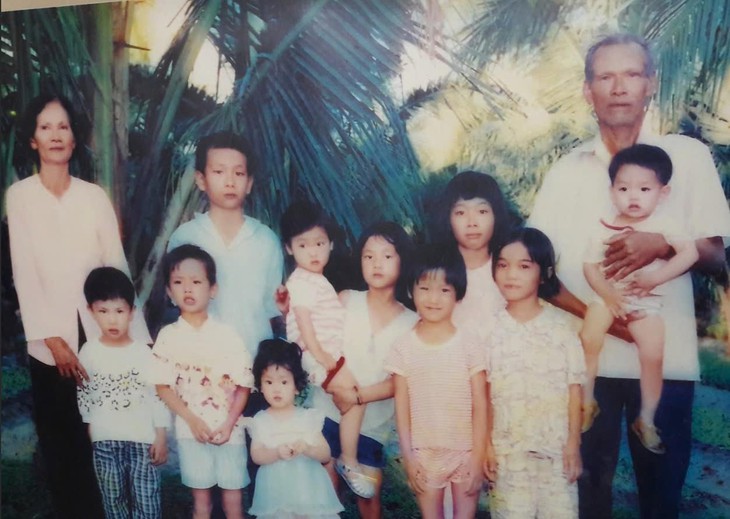My parents' return
He was once captured and imprisoned by the French, but he escaped from prison.
In 1954, he relocated to the North, carrying with him a heart heavy with longing: for his village, the river, and every beloved person back home.
My father worked in the transportation industry, stationed on the most treacherous section of the Truong Son Trail in western Quang Binh province.
The road was a constant threat of bombs and bullets, and death lurked everywhere. For him, that journey was a test of courage and perseverance, a way to contribute to the greater cause of the nation.
Whenever he visited home, my father would bring back stories about the roads he had just traveled, with names like: Da Deo Pass, Xuan Son Ferry, Khe O, Khe Ve, Road 20… and also about the trips he made to receive trucks and goods from the Vietnam-China border onto the route.
I remember very clearly the times my father came home for a visit and then left in a hurry. He didn't give his children the usual advice like being well-behaved, studying hard, and being obedient. Instead, he always said, "When you hear the sound of an airplane, run down to the bomb shelter quickly, understand? Make sure you survive and come back home, understand...?"
When I was little, I didn't understand why my father always said that. Only later did I realize that for him, living to return to his homeland was the greatest wish in life.
He once instructed them: "I don't know if I'll ever return this time, but after peace comes, try to find your way back home: When you get to Da Nang, find Han Market and ask for directions to Ha Than ferry terminal..."
Then, in 1973, my father came home for a visit, and he was overjoyed the day after the Paris Agreement was signed. That day, he quietly prepared a backpack, a few sets of clothes, and some simple personal belongings.
He told my mother, "As soon as Da Nang is liberated, I'll come back immediately." His eyes lit up, his voice firm, as if he had already mapped out the journey home, step by step, in his mind.
...And then that day finally came!
On the day Da Nang was liberated, at the end of March 1975, my father packed his backpack and headed to Highway 15. He just kept going, walking and flagging down military vehicles to hitch a ride at intervals.
It was no easy task, because at that time the South was not yet completely liberated, the situation was very complicated, transportation was scarce, and information was fragmented... but my father, with the memory and willpower of someone who had faced life and death situations, still managed to find his way back to Ha Than ferry terminal.
Looking at the Han River flowing gently under the afternoon sun, the river breeze carried the salty scent of the sea, of mud, of childhood memories. My father was silent; no one saw him cry, but his eyes were red and swollen, and he whispered, "He's back," "He's finally home."
Stepping onto the eastern bank, he was greeted by the banyan tree at the entrance to Ha Than market, now much taller, its branches spreading wide to shade a whole corner of the market.
Without hesitation, he ran straight along the old village road leading from the ferry landing to his house, his heart trembling with emotion, his steps quick, his heart pounding. Upon arriving at my grandmother's house, he couldn't help but shout, "Mom! Dad! I'm home!"
But only the wind answered; no one ran out, and no one called his name as he had hoped. He stood silently in the yard, as if holding his breath. A neighbor approached slowly and said, "Your parents passed away a few months ago..."
With tears welling up in his eyes and his hands clenched so tightly they trembled, he whispered, "I've come home, but it's too late, Mom and Dad!"
My parents and their grandchildren.
He went all over the neighborhood searching for relatives, reuniting with my aunts, uncles, and cousins after so many years of separation. No one could speak, only tight embraces, silent tears, and astonished looks of disbelief that my father was still alive and had returned.
Over the years, the old house is no longer intact, the garden is overgrown. The bamboo grove at the edge of the field has grown all the way to the riverbank.
He sat silently on a mound in the garden, looking out at the riverbank, listening to the wind and the waves, smoking a cigarette, taking a deep drag, then tilting his head back to look at the sparsely starry sky and exhaling slowly.
He later recounted, "I've never smoked a cigarette that tasted so good!" A cigarette of peace , smoked in his homeland after more than 20 years of separation by bombs and bullets.
Perhaps that was the moment he most fully felt the meaning of "PEACE," not in documents or news reports, but in the very breath of his homeland, in the rustling of bamboo leaves, in the gentle lapping of the Han River, in the unique scent of his native land.
The news of Saigon's liberation came a few days later, bringing overwhelming joy. My father was as happy as a child, "It's truly reunification! It's truly peace!", he kept repeating it for days on end.
A few days later, he went north to arrange some business, and hastily brought my mother and the children back to our hometown. The family's return felt like a dream come true.
Later, whenever they reunited, he would often recount the story of his return with an unending joy.
For him, that was the day his heart healed, the day all longing, separation, and fear vanished in the scent of his homeland. He often told his children and grandchildren: "I am a lucky man because the bombs and bullets spared me. I deeply miss my comrades who could not return."
My father passed away on a spring day. As we walked through the old garden where he used to sit smoking a cigarette on that first night of peace, the wind still blew, and the waves from the Han River still gently lapped against the shore. All of it has become a memory.
But we know that what he left behind was not just a memory, but also a vivid lesson about love for one's homeland, about faith and the aspiration for peace.
My father's wartime stories have become a sacred part of our memory, recounted to our children and grandchildren as a reminder of the value of peace, so that future generations will cherish and preserve it.
Thank you to over 600 readers who submitted entries to the Peace Storytelling Contest.
To commemorate the 50th anniversary of peace, the "Stories of Peace" writing contest ( organized by Tuoi Tre newspaper , sponsored by Vietnam Rubber Group, running from March 10 to April 15) invites readers to submit touching and unforgettable stories from families and individuals, as well as their thoughts on the reunification day of April 30, 1975, and the 50 years of peace.
The competition is open to all Vietnamese people, both in Vietnam and abroad, regardless of age or profession.
The "Stories of Peace" contest accepts submissions of up to 1,200 words in Vietnamese, with the encouragement of including photos and videos. Please send your submissions to hoabinh@tuoitre.com.vn. Only submissions via email will be accepted; submissions by post will not be accepted to avoid loss.
High-quality entries will be selected for publication in Tuoi Tre's publications, and will receive royalties. Entries that pass the preliminary round will be published in a book (no royalties will be paid - the book will not be sold). Entries must not have been submitted to any other writing competition or published in any media or social networks.
Authors submitting entries are responsible for the copyright of their articles, photos, and videos. Images and videos taken from social media without copyright will not be accepted. Authors must provide their address, phone number, email address, bank account number, and citizen identification number so that the organizers can contact them to send royalties or prizes.
As of April 15th, the "Telling Stories of Peace" writing contest had received over 600 entries from readers.
Award ceremony and book launch for "Stories of Peace".
The judging panel, comprising journalist Nguyen Truong Uy - Deputy Secretary-General of the Tuoi Tre newspaper editorial board , Dr. Nguyen Thi Hau - Deputy Secretary-General of the Vietnam Historical Science Association and Secretary-General of the Ho Chi Minh City Historical Society, and researcher-writer Nguyen Truong Quy, will review and award prizes to entries that have passed the preliminary round and select high-quality entries to receive awards.
The awards ceremony, book launch of "Stories of Peace," and the special issue of Tuoi Tre newspaper on April 30th are tentatively scheduled to be held at the Ho Chi Minh City Book Street at the end of April 2025. The organizing committee's decision is final.
Peace Storytelling Award
- 1st prize: 15 million VND + certificate, books, and the Tuoi Tre special issue .
- 2 second prizes: 7 million VND each + certificate, books, and the Tuoi Tre special issue .
- 3 third prizes: 5 million VND each + certificate, book, and Tuoi Tre special issue .
- 10 consolation prizes: 2 million VND each + certificate, books, and the Tuoi Tre special issue .
- 10 Readers' Choice Awards: 1 million VND each + certificate, books, and the Tuoi Tre special issue .
The voting points are calculated based on interaction with the post, where 1 star = 15 points, 1 heart = 3 points, and 1 like = 2 points.
The awards also come with certificates, books, and the Tuoi Tre 30-4 special issue.
Organizing Committee
Read more Back to Homepage
Back to the topic
LE THI NGA
Source: https://tuoitre.vn/ngay-ve-cua-cha-20250415130321717.htm









![[Photo] Voting for the 14th Central Committee of the Communist Party](/_next/image?url=https%3A%2F%2Fvphoto.vietnam.vn%2Fthumb%2F1200x675%2Fvietnam%2Fresource%2FIMAGE%2F2026%2F01%2F22%2F1769082445591_chi-9961-jpg.webp&w=3840&q=75)
![[Image] The 14th Party Congress implements the content on personnel work.](/_next/image?url=https%3A%2F%2Fvphoto.vietnam.vn%2Fthumb%2F1200x675%2Fvietnam%2Fresource%2FIMAGE%2F2026%2F01%2F22%2F1769088146286_ndo_br_1-6165-jpg.webp&w=3840&q=75)































































































Comment (0)